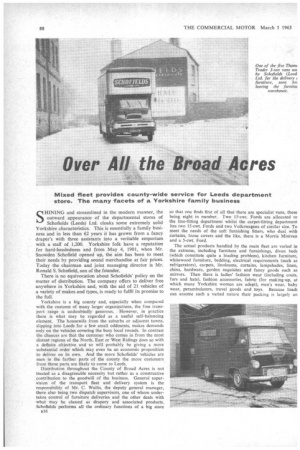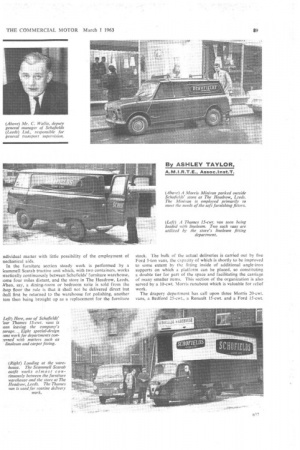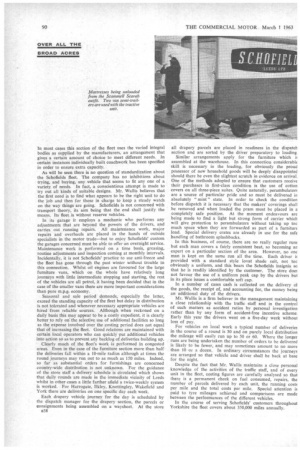Over All the Broad Acres
Page 90

Page 91

Page 92

If you've noticed an error in this article please click here to report it so we can fix it.
Mixed fleet provides county-wide service for Leeds department store. The many facets of a Yorkshire family business SHINING and streamlined in the modern manner, the outward appearance of the departmental stores of Schofields (Leeds) Ltd. cloaks some extremely solid Yorkshire characteristics. This is essentially a family business and in less than 62 years it has grown from a fancy draper's with three assistants into a veritable emporium with a staff of 1,200. Yorkshire folk have a reputation for hard-headedness and from May 4, 1901, when Mr. Snowden Schofield opened up, the aim has been to meet their needs by providing sound merchandise at fair prices. Today the chairman and joint managing director is Mr. Ronald S. Schofield, son of the founder.
There is no equivocation about Schofields' policy on the matter of distribution. The company offers to deliver free anywhere in Yorkshire and, with the aid of 21 vehicles of a variety of Makes and types, is ready to fulfil its promise to the full.
Yorkshire is a big county and, especially when compared with the customs of many larger organizations, the free transport range is undoubtedly generous. However, in practice there is what may be regarded as a useful self-balancing element, The housewife from the suburbs or adjacent towns, slipping into Leeds for a few small oddments, makes demands only on the vehicles covering the busy local rounds. In contrast the chances are that the customer who comes in from the most distant regions of the North, East or West Ridings does so with a definite objective and so will probably be giving a more substantial order which may even be an economic proposition to deliver on its own. And the more Schofields' vehicles are seen in the farther parts of the county the more customers from those parts are likely to come to Leeds.
Distribution throughout the County of Broad Acres is not treated as a disagreeable necessity but rather as a constructive contribution to the goodwill of the business. General supervision of the transport fleet and delivery system is the responsibility of Mr. C. Wallis, the deputy general manager, there also being two dispatch supervisors, one of whom undertakes control of furniture deliveries and the other deals with what may be classed as drapery and associated products. Schofields performs all the ordinary functions of a big store
B36
so that one finds first of all that there are specialist vans, these being eight in number, Two 15-cwt. Fords are allocated to the lino-fitting department whilst the carpet-fitting department has two 15-cwt. Fords and two Volkswagens of similar size. To meet the needs of the soft furnishing fitters, who deal. with curtains, loose covers and the like, there is a Morris Minivan and a 5-cwt. Ford.
The actual products handled by the main fleet are varied in the extreme, including furniture and furnishings, divan beds (which constitute quite a loading problem), kitchen furniture, whitewood furniture, bedding, electrical requirements (such as refrigerators), carpets, linoleums, curtains, lampshades, linen, china, hardware, garden requisites and fancy goods such is mirrors. Then there is ladies' fashion wear (including coats, furs and hats), fashion accessories, fabric (for making-up, at which many Yorkshire women are adept), men's wear, baby wear, perambulators, travel goods and toys. Because loads can assume such a varied nature their packing is largely an ndividual matter with little possibility of the employment of nechanical aids.
In the furniture section steady work is performed by a icammell Scarab tractive unit which, with two containers, works n-actically continuously between Schoftelds' furniture warehouse, ;ome four miles distant, and the store in The Headrow, Leeds. Alien, say, a dining-room or bedroom suite is sold from the hop floor the rule is that it shall not be delivered direct but ;hall first be returned to the warehouse for polishing, another tern then being brought up as a replacement for the furniture
stock. The bulk of the actual deliveries is carried out by five Ford 3-ton vans, the capacity of which is shortly to be improved to some extent by the fitting inside of additional angle-iron supports on which a platform can be placed, so constituting a double tier for part of the space and facilitating the carriage of many smaller items. This section of the organization is also . served by a 10-cwt. Morris runabout which is valuable for relief work.
The drapery department has call upon three Morris 20-cwt. vans, a Bedford 25-cwt., a Renault 15-cwt. and a Ford 15-cwt. In most cases this section of the fleet uses the varied integral bodies as supplied by the manufacturers, an arrangement that gives a certain amount ofchoice to meet different needs. In certain instances individually built coachwork has been specified in order to ensure extra capacity.
As will be seen there is no question of standardization about the Schofields fleet. The company has no inhibitions about trying, and buying, any vehicle that seems to fit any one of a variety of needs. In fact, a conscientious attempt is made to :try out all kinds of suitable designs. Mr. Wallis believes that the first need is to find what appears to be the right unit to do the job and then for those in charge to keep a steady watch on the way things are going. Schofields is not concerned with transport theory, its aim being that the end shall justify the means. Its fleet. is without reserve vehicles.
In its garage it employs a mechanic who performs any adjustments that are beyond the powers of the drivers, and carries out running repairs. All maintenance work, major repairs and overhauls are placed in the hands of outside specialists in the motor trade—but to enjoy Schofields. custom the garages concerned must be able to offer an overnight service. Maintenance work is performed on a time basis, greasing, routine adjustments and inspection coming at monthly intervals. Incidentally, it is not Schofields' practice to use anti-freeze and the fleet has gone through the past winter without trouble in this connection. Whilst oil engines are favoured for the large furniture vans, which on the whole have relatively long journeys with little intermediate stopping and starting, the rest of the vehicles are all petrol, it having been decided that in the case of the smaller vans there are more important considerations than pure m.p.g. economy.
Seasonal and sale period demands, especially the latter, exceed the standing capacity of the fleet but delay in distribution is not tolerated and whenever necessary appropriate vehicles are hired 'from reliable sources. Although when reckoned on a daily basis this may appear to be a costly expedient, it is clearly better to rely on the selective use of additional facilities so long as the expense involved over the costing period does not equal that of increasing the fleet. Good relations are maintained with certain local operators who can quickly put additional vehicles into action so as to prevent any backlog of deliveries building up.
Clearly much of the fleet's work is performed in congested areas. Even in the case of the furniture section more than half the deliveries fall within a 10-mile radius although at times the round journeys may run out to as much as 150 miles. Indeed, so far as substantial orders for furnishings are concerned country-wide distribution is not unknown. For the guidance of the store staff a delivery schedule is circulated which shows that daily rounds are made in the immediate vicinity of Leeds whilst in other cases a little farther afield a twice-weekly system is worked. For Harrogate, Ilkley, Knottingley, Wakefield and York there are deliveries on one specific day each week.
Each drapery vehicle journey for the day is scheduled by the dispatch manager for the drapery section, the parcels or consignments being assembled on a waysheet. At the store
B38 all drapery parcels are placed in readiness in the dispatch section and are sorted by the driver preparatory •to loading
Similar arrangements apply for the furniture which is assembled at the warehouse. In this connection considerable skill is necessary in the loading, for obviously the proud possessor of new household goods will be deeply disappointed should there be even the slightest scratch in evidence on arrival One of the methods adopted to ensure that customers receive their purchases in first-class condition is the use of cotton covers on all three-piece suites. Quite naturally, perambulators are a source of particular pride and so must be delivered in absolutely "mint" state. In order to check the condition before dispatch it is necessary that the makers' coverings shal] be removed and when loaded the pram must be placed in a completely safe position. At the moment endeavours are being made to find a light but strong form of carrier which will give protection to perambulators without taking up toe much space when they are forwarded as part of a furniture load. Special delivery crates are already in use for the safe handling of bathroom splashbacks,
In this business, of course, there are no really regular runs but each man covers a fairly consistent beat, so becoming an expert on a particular section of the area. However, no one man is kept on the same run all the time, Each driver is provided with a standard style lovat shade suit, not toe obviously a uniform, and this bears the Schofields insignia se that he is readily identified by the customer, The store does not favour the use of a uniform peak cap by the drivers bul in its place issues a comfortable soft cap.
In a number of cases cash is collected on the delivery ol the goods, the receipt of, and accounting for, the money being an additional duty of the drivers.
Mr. Wallis is a firm believer in the management maintaining a close relationship with the traffic staff and in the controi of such matters as accident ratios by personal investigation rather than by any form of accident-free incentive scheme Early this year the drivers went on a five-day week withoul loss of pay.
For vehicles on local work a typical number of deliveries in the course of a round is 30 and on purely local distribution the mileage will easily run up to 50 or 60. Where the longet runs are being undertaken the number of orders to be delivered is likely to be fewer, and may sometimes amount to no more than 10 or a dozen. In ordinary circumstances the journeys are arranged so that vehicle and driver shall be back at base for the night Despite the fact that Mr. Wallis maintains a close personal knowledge of the activities of the traffic staff, and of every unit in the fleet, costing figures are carefully analysed so thal there is a permanent check on fuel consumed, repairs, the number of parcels delivered by each unit, the running costs per mile and the total costs per mile. Special attention is paid to tyre mileages achieved and comparisons are made between the performances of the different vehicles.
In the course of serving Schofields' customers throughout Yorkshire the fleet covers about 350,000 miles annually.
















































































































































